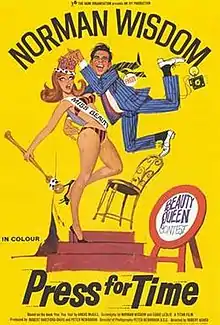Press for Time
Press for Time is a 1966 British comedy film starring Norman Wisdom. The screenplay was written by Eddie Leslie and Norman Wisdom, based on the 1963 novel Yea Yea Yea, by Angus McGill. It was partly filmed in Teignmouth in Devon. It was the last film Wisdom made for the Rank Organisation.
| Press for Time | |
|---|---|
 Original British 1-sheet poster | |
| Directed by | Robert Asher |
| Written by | Eddie Leslie Norman Wisdom Angus McGill (book) |
| Produced by | Robert Hartford-Davis Peter Newbrook |
| Starring | Norman Wisdom |
| Cinematography | Jonathan Usher |
| Edited by | Gerry Hambling |
| Music by | Mike Vickers |
| Distributed by | Rank Film Distributors |
Release date |
|
Running time | 102 minutes |
| Country | United Kingdom |
| Language | English |
Plot
Norman Shields (Norman Wisdom) is a newspaper seller in London, a job organised for him by his grandfather, the Prime Minister (also played by Wisdom). After causing chaos. he is found a new job as reporter on a newspaper in the fictional seaside town of Tinmouth (partly filmed in the real seaside town of Teignmouth). The newspaper owner, an MP, has ambitions to become a junior minister and so goes along with the Prime Minister's 'request'.
During his time in Tinmouth, the well-meaning Norman gets himself into all sorts of trouble whilst reporting, such as starting an argument at a council meeting which develops into an all-out fight between members. He later becomes the reporter for the entertainment section of the newspaper, covering a beauty contest which his girlfriend Liz wins. They later return to London together, leaving a more politically settled Tinmouth behind.
Cast
- Norman Wisdom as Norman Shields/ Emily, his mother/ Wilfred, his grandfather (the P.M.)
- Derek Bond as Major R.E. Bartlett
- Derek Francis as Alderman Corcoran
- Angela Browne as Eleanor Lampton
- Tracey Crisp as Ruby Fairchild
- Allan Cuthbertson as Mr. Ballard (Attorney General)
- Noel Dyson as Mrs. Corcoran
- Peter Jones as Robin Willoughby (photographer)
- David Lodge as Mr. Ross (editor of the Tinmouth Times)
- Stanley Unwin as Mr. Nottage (Town Clerk)
- Frances White as Liz Corcoran
- Michael Balfour as Sewerman
- Tony Selby as Harry Marshall (reporter for the County Chronicle)
- Michael Bilton as Councilor Hedge
- Norman Pitt as Councilor Quilter
- Hazel Coppen as Granny Fork
- Totti Truman Taylor as Mrs. Doe Connor
- Toni Gilpin as P.M.'s secretary
- Gordon Rollings as Bus Conductor
- Imogen Hassall as Suffragette (uncredited)
- Helen Mirren as Penelope Squires (uncredited)
Reception
It was one of the twelve most popular films at the British box office in 1967.[1]
References
- "Sean Connery tops the bill again". The Guardian Journal. 30 December 1967. p. 6.